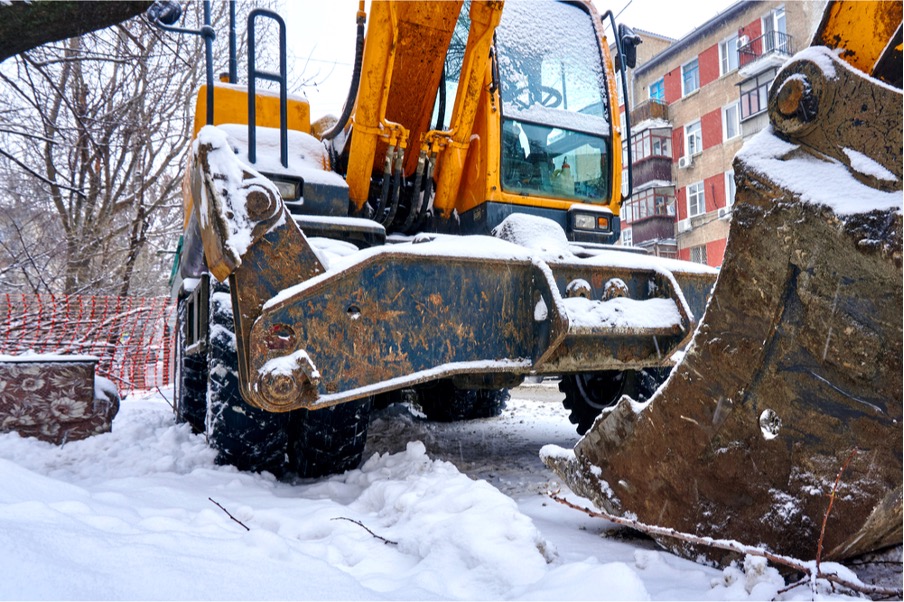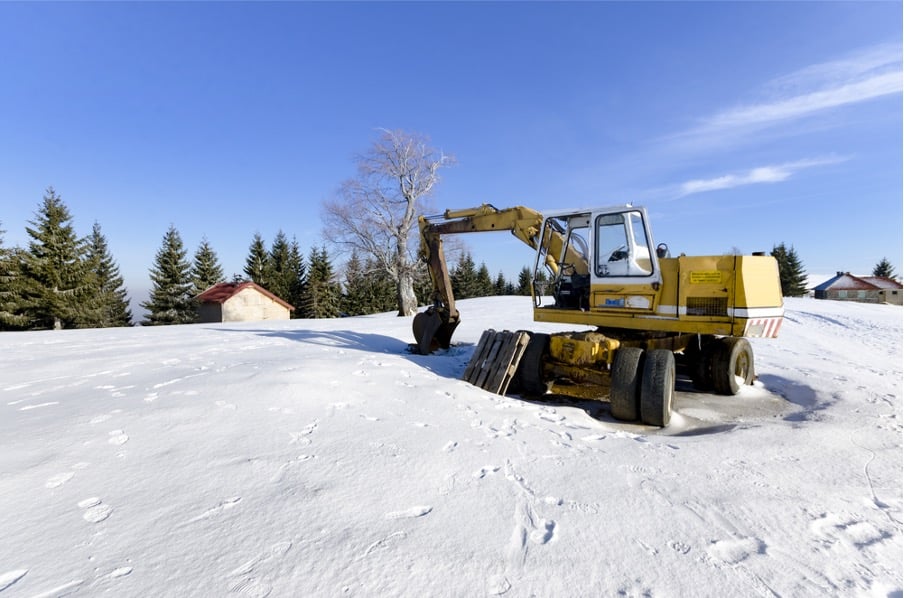Most construction companies prefer to operate during the spring or summer, but working in winter conditions may be necessary due to the nature of a specific project, or being located in an area that’s cold most of the year (we’re looking at you, Minnesota).

The struggle is real
To battle the deep freeze, which can turn soft and cooperative earth into an icy barrier that can be up to 12 inches deep, there are 7 things to keep in mind. They may seem like common sense, but it is always good to remind yourself how to prepare for success.
-
Prepare your team
Frostbite and hypothermia are the last things you want to deal with when doing any type of construction work during the winter. You need to ensure that your team is dressed in warm clothing to avoid health safety hazards resulting from weather-induced conditions.
If conditions are extreme, you may even need to consider spacing out the project to prevent overexposing your troops to the elements. In addition, wearing reflective gear will prevent hazards that may arise from low visibility.
But, what if your employees are injured in these harsh conditions? Who pays for medical treatment for injuries sustained on the job? This is exactly why Workers Compensation insurance exists. Buy it.
-
Prepare your equipment
For your excavators, be sure to inspect boom, stick, and attachments in a repair shop before moving them to the construction site. It is always more expensive and less efficient to conduct any repairs on-site, but in case the situation arises, it’s not a bad idea to stock up on wear parts and keep them on hand.
-
Invest in frost-proof equipment
In regions where the frost penetration under snow cover is less than 12 inches, excavation is not difficult. If the frost exceeds that margin, you can’t always use conventional digging and excavation equipment.
Aside from the fact that many of them cannot operate effectively in extreme cold, frozen ground can damage or even break the equipment. You might need to consider investing in equipment designed for frozen ground excavation, like hydraulic rippers or hydro vacs which use warm water sprayed at high pressure to move frozen soil, and trenching machines fitted with frost-proof tools.
-
Keep your supplies safe
Weather conditions can prevent you from completing specific temperature-dependent tasks like spraying insulation or drying concrete. In addition, material like caulks and adhesives need to be kept at controlled temperatures. Although there are solutions and alternatives to these problems, like choosing to use precast concrete during the winter, you need to keep in mind that this will take extra effort on your part.
The other aspect of keeping your equipment safe is site security. Just because the weather is cold, it may not be enough to discourage thieves.

-
Plan for emergencies
Keep an emergency kit in all vehicles complete with extra clothing, safety equipment, blankets, food and water, batteries, matches, flares, and first-aid kits. You’ll also need to secure General Liability insurance which covers injuries to third parties and damage to property. A quick reminder about Workers Compensation. This policy protects your employees from financial loss as a result of bodily injury, disability, or fatality in the course of their work.
Even so, the last thing you want for your project is a legal case, so when faced with heavy snowstorms and blizzards, it is best to postpone work on the site until the weather is no longer as extreme.
-
Evaluate whether it’s worth it
Aside from having to take extra safety measures, use specialized equipment, and deal with potential setbacks and delays, working during the winter can also put a strain on your budget.
The cost of fuel is much higher at winter construction sites, and with the added costs of additional equipment such as ground thaw machines, insulated blankets, and anti-freezing concrete components, this might be well past your budget. In the United States, for instance, digging during frigid weather can induce an extra $5,000 – $10,000.
-
Consider the alternatives
Winter conditions can definitely increase fuel, material, and labour expenses, but with modern equipment, the entire construction process beginning with excavation up to the laying of foundations is entirely doable. Advances in technology are on your side, from project planning apps through to new equipment options.
Stay competitive. Prepare for success
To be successful in a highly competitive industry like excavation, every business owner is on the lookout for opportunities. Is winter digging and excavation the chance to get ahead of the competition?
Interesting Related Article: “5 Tips on Construction Equipment Management and Maintenance“

